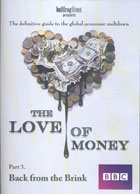
The Love of Money 2009
Distributed by Bullfrog Films, PO Box 149, Oley, PA 19547; 800-543-FROG (3764)
Produced by British Broadcasting Corporation (BBC)
Directed by Paul Mitchell
DVD, color, 156 min.
Sr. High - Adult
Business, Economics
Date Entered: 08/18/2010
Reviewed by Michael J. Coffta, Business Librarian, Bloomsburg University of PennsylvaniaThe collapse of Lehman Brothers on Sept 12, 2008 was not only a shocking event in it being the fall of a corporate giant, but it was both a symptom of and a catalyst to a potential complete global economic meltdown. This positively brilliant documentary offers a sobering realization of precisely how close to the brink of disaster the world economy came.
Disk 1 consists of nearly hour-by-hour accounts of meetings of the Treasury Secretary and Federal Reserve representatives. Reluctant after a string of bailouts, the U.S. government refused to help. All the while, Bank of America and Barclay’s refuse to save rival Lehman Brothers, and shrewdly positioned themselves for life after its fall. Admittedly, the interspersed biographies of Lehman executives throw off the intense and alarmist pace of the film. These histories do provide useful contexts for the actions and motives on the fateful days of September 12 – 14, 2008 and those that followed. The film also grandly achieves its objective of creating an accurate portrait of Lehman’s financial position. In so doing, it takes a breath from its feverish pace to demonstrate how Lehman Brothers reached demise. With clear explanations of technical terms, the filmmakers describe the “fool’s paradise” of high risk investments and leveraged securities. The shockwaves were felt around the world as the largest bankruptcy in history, ten times bigger than Enron, wiped $700 billion in wealth off stock market values. Other companies were set scrambling, looking to liquidate assets to meet their payrolls. The disk concludes with an examination of greed, loss of fear, and disregard for basic economics.
Disc 2 examines the rapid profit taking before the meltdown developed and accelerated. The film takes a deep historical route from the fall of the Berlin Wall to the collapse of Lehman Brothers. In a much more macro view of the meltdown than Disk 1, this work offers insights into globalization, migration, deregulation, and strident efforts by investment firms to unleash free market capitalism in its purest form. There are extensive interviews with former Fed chair Alan Greenspan, who both supported deregulation (in general) and warns that similar crises will happen again.
Disk 3 analyzes the responses to the crisis, and subsequent preventative measures. It explores the actions, inactions, and hesitations that worsened the crisis. Despite the Fed government’s unwillingness to bail out Lehman Brothers, it bailed out AIG the next day. The events border on surreal as the audience gains understanding of movements among power brokers, chiefly Bernanke’s call for action within 48 hours to prevent a banking system failure. The Bush administration’s immediate response was to buy up “toxic” assets. Europeans criticized this solution, as it did not inject capital into the banking system. After the fall of Lehman Brothers, banking system and debt crises in Iceland and Ireland nearly brought the global banking system to a halt. The series concludes with a forecasting of new crises, and a scrutiny of the lingering, crippling damage of this disaster.
The unrelenting revelations of this film, and the frequent use of expressions such as, “there could have been riots” and “complete economic collapse,” drive home the severity of the situation. While objectivity is a hallmark of any documentary review, the outright horror, shock, and outrage that are generated by this documentary series is undeniable. Similarly, while a responsible reviewer generally avoids using hyped-up media-splash bites, this series is a truly a “must see.” The film is promoted as “the definitive guide to the global economic meltdown.” This is no exaggeration, and is indeed a well deserved tagline.